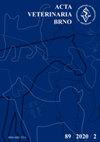Influence of organic zinc on lactation performance and somatic cell count in dairy cows
IF 0.7
4区 农林科学
Q3 VETERINARY SCIENCES
引用次数: 0
Abstract
The objective of the study was to evaluate the effect of organically chelated zinc methionine (Zn-Met) supplementation on lactation performance of dairy cattle, i.e. milk yield (MY), milk components, and the somatic cell count (SCC) in early lactation. Eighty multiparous cows received two treatments (n = 40 per group) from 21 days prepartum throughout 14 weeks post partum (p.p.). Treatments consisted of 1) supplemental Zn-Met at the dose of 30 mg Zn/kg dry matter (DM) of the total mixed ration (TMR) for the supplemented (S) group; and 2) basal TMR without supplementation for the control (C) group. Daily MY of Zn supplemented cows 30 days p.p. was in not significantly affected (P > 0.05) by the treatment. After 60 days, the MY of the S-group was significantly higher (S: 44.70 ± 4.24 kg vs. C: 42.08 ± 4.60 kg, respectively); (P < 0.05). Ninety days p.p. there was a highly significant difference (P < 0.005) as well (S: 43.22 ± 4.47 kg vs. C: 39.98 ± 4.80 kg). Supplemented cows also produced significantly more milk fat and milk protein than the control on days 60 and 90 of the trial. There was a significant drop and a decreasing trend during the entire trial in SCC in S-group. Milk quality and udder health were positively affected by the Zn-Met treatment. This finding has an important implication for veterinary practice in an era of antibiotic reduction.有机锌对奶牛泌乳性能和体细胞计数的影响
本研究旨在评价饲粮中添加有机螯合蛋氨酸锌(Zn-Met)对泌乳早期奶牛泌乳性能的影响,包括产奶量(MY)、乳成分和体细胞计数(SCC)。80头产牛在产前21天至产后14周期间接受2次治疗,每组40头。处理包括:1)添加(S)组以总混合日粮(TMR)的30 mg Zn/kg干物质(DM)的剂量添加Zn- met;2)对照组(C)不补充基础TMR。补锌对奶牛30天p.p.日代谢能无显著影响(P < 0.05)。60 d后,S组的MY显著高于C组(S: 44.70±4.24 kg vs. C: 42.08±4.60 kg);(p < 0.05)。P < 0.005) (S: 43.22±4.47 kg vs. C: 39.98±4.80 kg)。在试验的第60天和第90天,奶牛的乳脂和乳蛋白产量也显著高于对照组。s组SCC在整个试验过程中有显著下降和下降趋势。锌- met处理对牛奶品质和乳房健康有积极影响。这一发现对抗生素减少时代的兽医实践具有重要意义。
本文章由计算机程序翻译,如有差异,请以英文原文为准。
求助全文
约1分钟内获得全文
求助全文
来源期刊

Acta Veterinaria Brno
农林科学-兽医学
CiteScore
1.00
自引率
33.30%
发文量
36
审稿时长
18-36 weeks
期刊介绍:
ACTA VETERINARIA BRNO is a scientific journal of the University of Veterinary and Pharmaceutical Sciences in Brno, Czech Republic.
The scientific journal Acta Veterinaria Brno is dedicated to the publication of original research findings and clinical observations in veterinary and biomedical sciences. Original scientific research articles reporting new and substantial contribution to veterinary science and original methods that have not been submitted for publication elsewhere are considered for publication. A written statement to this effect should accompany the manuscript, along with approval for publication by the author´s head of department. The authors bear full responsibility for the contents of their contribution. Book reviews are published, too.
 求助内容:
求助内容: 应助结果提醒方式:
应助结果提醒方式:


